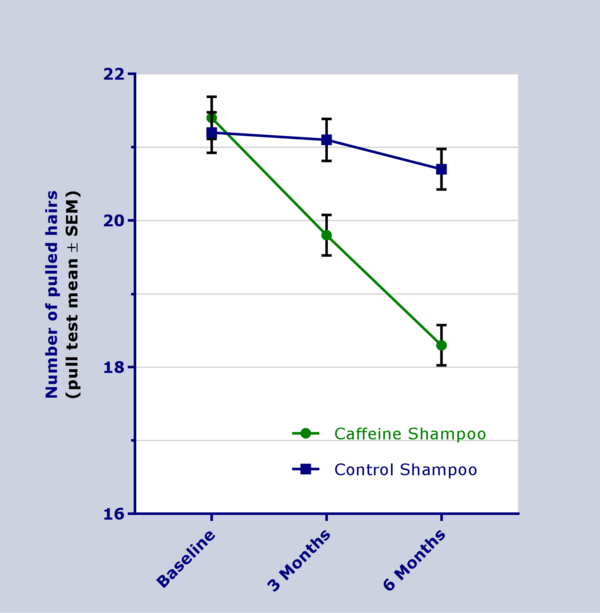Efficacy of a caffeine-containing shampoo formulation of Plantur 39 against menopausal hair loss in women
Conducted at the Center for Cosmetic Research of the Catholic University Sacred Heart in Rome
General:
Hair loss is a stressful condition for women, often appearing during their forties or fifties when hormonal changes affect their hair follicles. Described as female pattern hair loss (FPHL) or female androgenetic alopecia, it affects around 30-50% of menopausal women. Although the intensity of hair loss is not as severe as in men, it causes a progressive reduction in hair density over crown and frontal scalp with retention of the frontal hairline.
Method:
The aim of this study was to evaluate the efficacy of a caffeine shampoo by Plantur 39. The investigation was performed in a randomised, controlled, double-blind, parallel group study design in accordance to the high standards of good clinical practices (ICH GCP). Participants were 140 women (test group: n=70, control group: n=70), aged 40-70 years with androgenetic alopecia and diffuse hair loss determined by hair count. Exclusion criteria were use of topical or oral hair restorers during the past 6 months as well as several pathological hair loss disorders and scalp conditions.
Either the test shampoo or the placebo shampoo was used by the participants daily over a period of 6 months. The products were applied and massaged into scalp and hair for at least 2 minutes followed by a rinse off. The investigational test product consisted of an active Caffeine Complex within a suitable shampoo formulation. The placebo product consisted of the same formulation without the Caffeine Complex.
The intensity of hair loss was evaluated using the hair pull test before, after 3 months, and after 6 months of either product use. In addition to that, both participants and investigator evaluated the efficacy of the product after 3 and 6 months of product use.
Results:
The pull test showed a reduction of pulled hairs after 3 and 6 months of use of the caffeine shampoo, whereas the number of pulled hairs remained stable for participants using the placebo shampoo. This reduction seen in subjects using the caffeine containing shampoo was significantly greater in comparison to the reduction seen in those using the placebo shampoo.
The result seen via the hair pull test was also reflected by the outcome for the overall participants’ contentment. After 6 months more than 70% of the participants using the caffeine containing shampoo reported their contentment with the product. In contrast to that, those subjects using the placebo shampoo expressed a significantly less contentment (28%) after 6 months.
The subjective assessment of the product efficacy additionally confirmed that after 6 months of usage the intensity of hair loss and the number of hairs in the basin during daily combing decreased significantly more for the caffeine containing shampoo when compared to the placebo shampoo.
Furthermore, the assessment of the hair quality by the investigator revealed that strength and thickness of hairs as well as the extent of hair fall improved significantly more in the caffeine group compared to the placebo group.
Summary:
The results of this study demonstrate that the Caffeine Complex in Plantur 39 Shampoo does not only reduce hair loss, but also positively impacts hair strength and hair thickness after the daily use of the Shampoo over a period of 6 months.
Published study:
C. Bussoletti, M. V. Tolaini, L. Celleno, G Ital Dermatol Venereol 2018.

